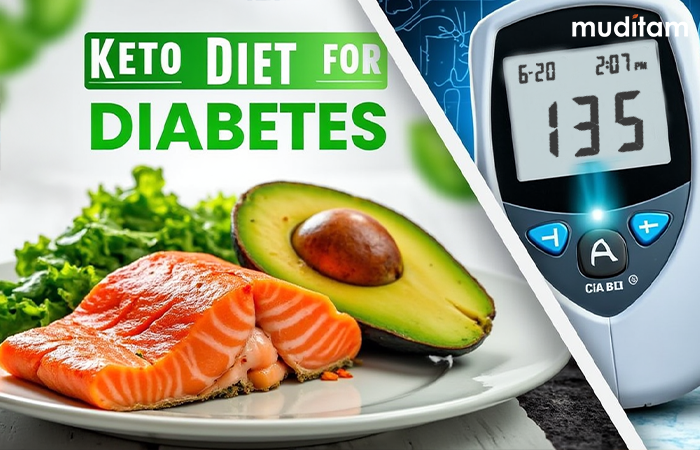
Keto Diet for Diabetes : Benefits and Tips
Share
Diabetes is a disease that requires careful control of diet choices. Moreover, the keto diet is gaining interest for its potential to aid in the diabetes management levels. What is the keto diet exactly as well as is it a viable alternative for people suffering from diabetes? Let's discuss the advantages, tips, and other things to bear in mind when contemplating this type of diet.
What is the Keto Diet?
A ketogenic or "keto" diet is a diet that focuses on cutting down on carbohydrates as well as increasing the amount of healthy fats. The shift in macronutrients causes the body to use fats for energy, instead of carbohydrates, a process that is known as ketosis.

The typical keto diet appears like this:
- High Fat: 70 to 75 percent of your daily calories
- Moderate Protein: 20-25%
- Low Carbohydrates: 5-10%
Through reducing the amount of carbs, this diet can help maintain blood sugar levels which is vital for people suffering from diabetes.
Keto Diet Benefits For Diabetes
The ketogenic diet is your path to vibrant health, offering weight loss, boundless energy, and mental clarity. Embrace this lifestyle and unlock the best version of yourself. Here are some ketogenic diet benefits:
- Better Blood Sugar Control: Because keto diets are very low in carbohydrates, this helps to prevent huge rises in blood sugar. This helps manage diabetes and might even decrease the need for medications (but always consult with a physician before making any changes).
- Improves Insulin Sensitivity: For people suffering from type 2 diabetes, the issue of insulin resistance can be a frequent problem. The keto diet can aid in the body's use of insulin more efficiently, which can improve overall blood sugar control.
- Encourages Weight Loss: Weight gain is a significant risk factor for developing diabetes. The keto diet could reduce weight by reducing cravings and stimulating fat-burning, which can help improve diabetes management.
- May Help Fatty Liver: Many people who suffer from type 2 diabetes also suffer from fatty liver disease. The keto diet's emphasis on burning fat may aid in reducing the amount of liver fat and improve health.
Challenges of the Keto Diet for Diabetes
- Risk of Low Blood Sugar: Inadequately reducing carbs could lead to hyperglycemia (low levels of blood sugar). This is particularly dangerous for those taking insulin or other diabetic medication. Always monitor your blood sugar levels closely.
- It's Not for Everyone: The keto diet is restrictive, and some people may not find it easy to adhere to. It requires careful planning to ensure you're getting all the nutrition your body requires.
- Initial Side Effects: When starting the keto diet, some people may experience symptoms such as fatigue, headaches, or irritation. Known as "keto flu," these symptoms tend to diminish after the body adjusts.
Tips for Following the Keto Diet Safely
- Consult Your Doctor First: Before starting a ketogenic diet, speak with your physician or dietitian. They can assist you in creating an effective plan suitable for your health needs.
- Take It Slow: Don't reduce carbs completely at once. Gradually lower your intake over a week or two to allow your body to adjust.
- Choose Healthy Fats: Opt for healthy choices like avocados, nuts, seeds and olive oil.
- Stay Hydrated: The keto diet may cause water loss, especially at the beginning. Drink plenty of fluids and consider adding electrolytes to maintain balance.
- Monitor Your Blood Sugar: Keep a close eye on your blood sugar levels, particularly in the early phases of your diet, to avoid unexpected drops.
- Eat Enough Protein: While focusing on fats, don't overlook protein to maintain muscle strength and overall health.
Foods to Eat on a Keto Diet
Here’s a brief list of foods ideal for keto-friendly eating:
- Healthy Fats: Avocado, olive oil, coconut oil, nuts, and seeds
- Low-Carb Veggies: Spinach, broccoli, cauliflower, and zucchini
-
Proteins: Chicken, eggs, fatty fish like salmon, and tofu.
Avoid sugary foods, grains, and starchy vegetables such as corn and potatoes.

Who Should Avoid the Keto Diet?
The keto diet isn't suitable for everyone. Be cautious or avoid it if you:
- Have type 1 diabetes (due to the risk of diabetic ketoacidosis).
- Have liver or kidney issues.
- Are pregnant or breastfeeding.
Additional Tips for Managing Diabetes
A ketogenic diet can be part of a broader strategy to control diabetes. Here are some extra tips:
- Regular Exercise: Helps improve insulin sensitivity.
- Manage Stress: Stress can affect blood sugar levels. Try meditation, yoga, or breathing exercises.
- Track Your Progress: Monitor how your body reacts to the diet and make adjustments as needed.
Is the Keto Diet Right for You?
The keto diet can be an effective tool to manage diabetes, but it’s not a one-size-fits-all solution. What works for one person may not suit another. Pay attention to your body, work with your healthcare professional, and take the process step-by-step.
Conclusion
A ketogenic diet can help manage diabetes, improve blood sugar levels, and boost overall health. However, it’s essential to proceed carefully and in collaboration with a qualified professional. By integrating the keto diet with other healthy lifestyle changes, you can take significant steps toward living a healthy life with diabetes.
Your journey toward better health is personal. Every small change can make a big difference. Remember to be kind to yourself, celebrate your achievements, and keep moving forward. You’re on the right path!
You May Also Like



